Skool vs Discord: Which Platform is Right for Your Community? A Comprehensive 2025 Comparison
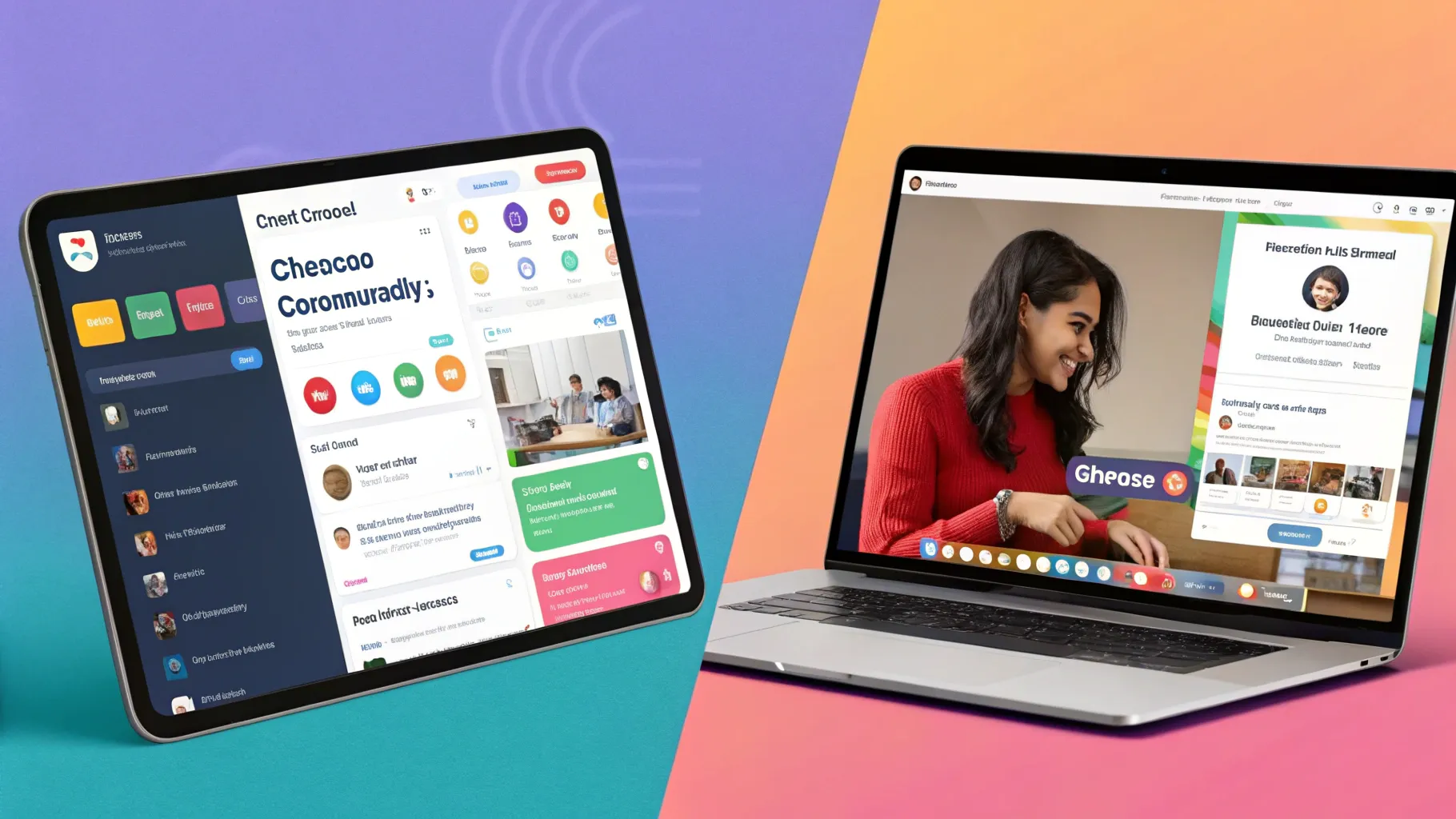
When it comes to building an online community or hosting courses, selecting the right platform is paramount to your success. As an entrepreneur and content creator, I’ve explored many tools to find the best fit for different needs. Today, I’m sharing an in-depth comparison of two popular platforms: Skool and Discord. This detailed guide will help you understand their unique features, strengths, weaknesses, target audiences, monetization options, integrations, and much more.
Whether you are an educator, creator, or community manager, this article will walk you through everything you need to know to make an informed decision on which platform suits your goals best. I will also include screenshots from my own experience to give you a visual feel of each platform. Let’s dive into the ultimate showdown of Skool vs Discord.
Table of Contents
- Step 1: Understanding the History and Foundations
- Step 2: Comparing Core Features and Usability
- Step 3: Identifying the Target Audience
- Step 4: Understanding Pricing and Accessibility
- Step 5: Weighing Strengths and Weaknesses
- Step 6: Community Building Capabilities
- Step 7: Content Creation and Hosting
- Step 8: User Experience and Customization
- Step 9: Monetization and Business Tools
- Step 10: Integration and Expansion Capabilities
- Step 11: Multi-Platform Support and Accessibility
- Step 12: Security and Support Systems
- Step 13: Making the Final Decision
- Frequently Asked Questions (FAQ)
- Conclusion
Step 1: Understanding the History and Foundations
Before choosing between Skool and Discord, it’s essential to understand their origins and the philosophies behind each platform.
Skool’s Background
Skool was founded in 2018 by entrepreneur Sam Ovens with a clear mission: to provide a comprehensive platform for creators to build, manage, and monetize their online communities efficiently. It is designed specifically with course creators and entrepreneurs in mind. Skool focuses on delivering an all-in-one solution that combines course creation tools—such as quizzes and assignments—with powerful community management features.
Discord’s Origin
Discord started in 2015 primarily as a communication tool for gamers. Over time, it has expanded into a multipurpose platform supporting text and voice chat, video calls, and screen sharing. While it began as a gaming-centric community tool, Discord now caters to a wide range of users beyond gaming, including hobbyists, professionals, and educators.
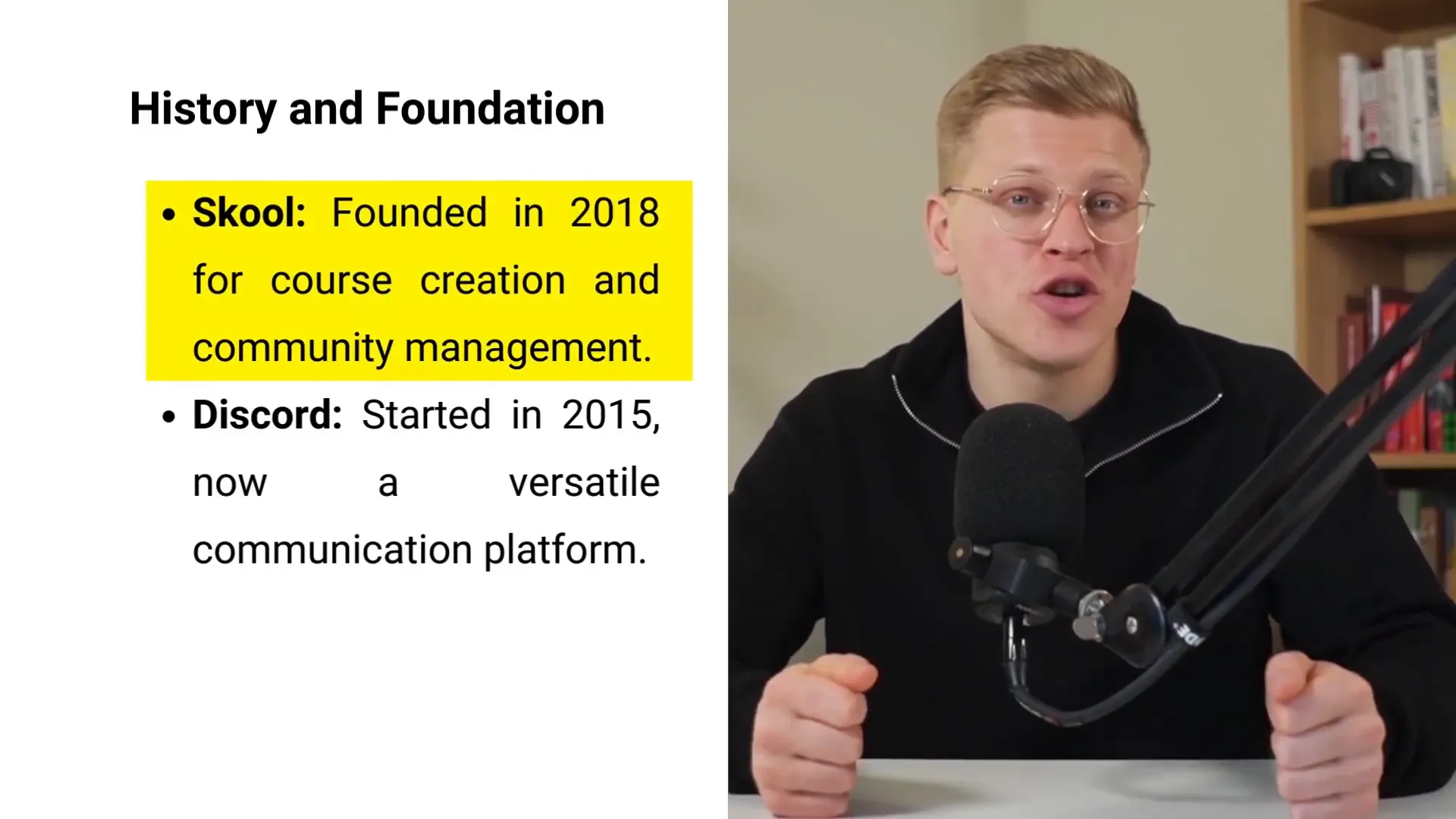
Step 2: Comparing Core Features and Usability
Both Skool and Discord offer unique features that cater to different types of communities. Understanding their core functionalities will help you identify which platform aligns with your needs.
Skool’s Core Features
- Course Creation Tools: Skool integrates quizzes, assignments, and discussion forums seamlessly within its platform, creating an interactive learning environment.
- Business Tools: It offers payment processing, analytics, and marketing capabilities, enabling creators to manage their business efficiently.
- Community Management: Features such as live chat, polls, and member management tools help foster an engaged, organized community.
Discord’s Core Features
- Real-Time Communication: Emphasizes voice, text chat, video calls, and screen sharing for dynamic interaction.
- Customization: Allows custom emojis, roles, and permissions to personalize the community experience.
- Community Building: Focuses on direct interaction, making it ideal for casual and fast-paced conversations.
While Skool is designed as a holistic platform for course hosting and community management, Discord excels as a communication hub with rich real-time interaction features.
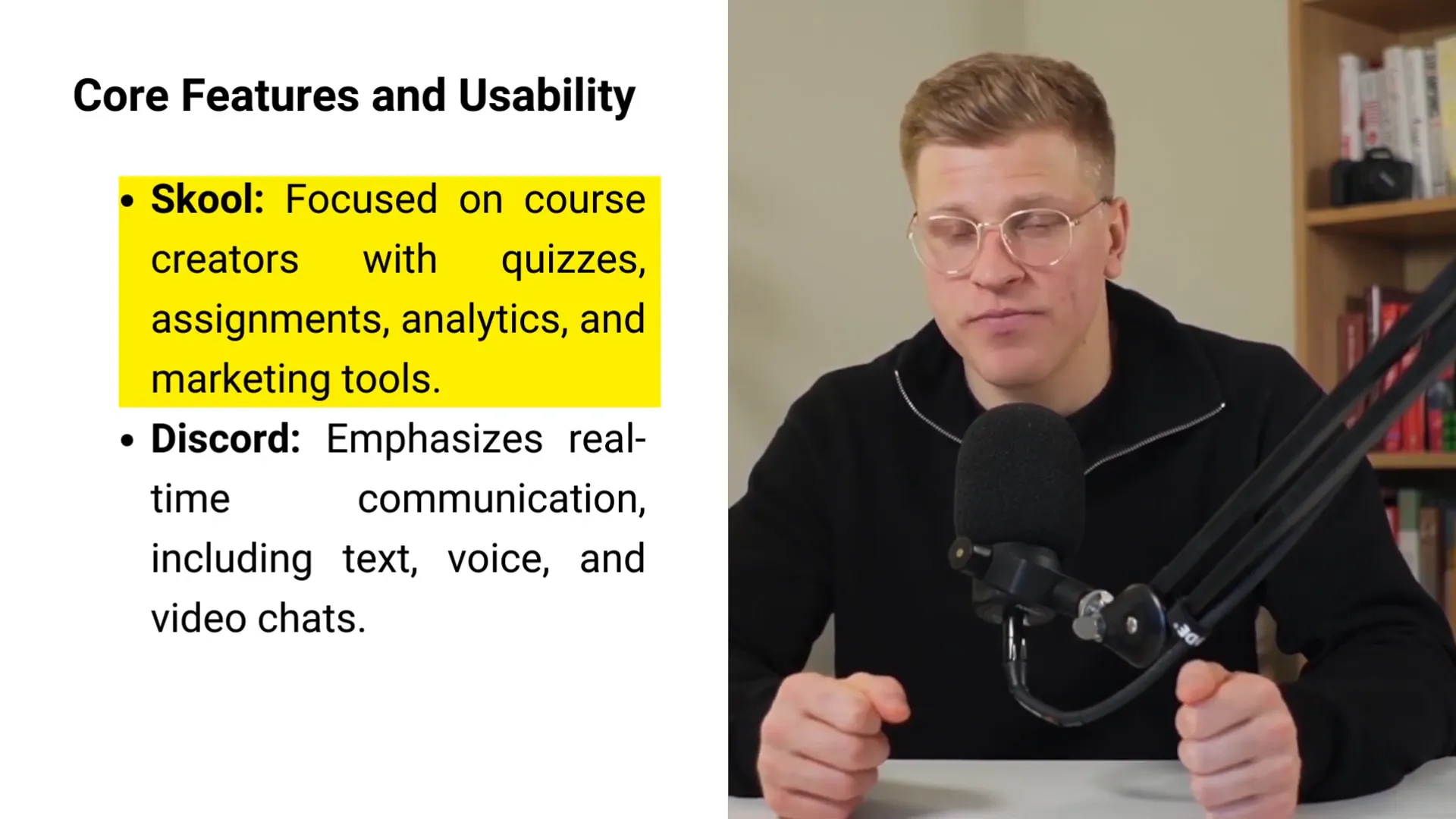
Step 3: Identifying the Target Audience
Knowing who each platform serves best is crucial for making the right choice.
Who Should Use Skool?
Skool is tailored for entrepreneurs, educators, and creators who want a structured platform to deliver courses and build communities around their content. Its tools are designed to enhance engagement and foster learning, making it perfect for professional development, coaching, and educational purposes.
Who Should Use Discord?
Discord’s audience is much broader. It appeals to gamers, hobbyists, professionals, and anyone seeking a platform for real-time communication and collaboration. Its versatility allows it to support various types of communities, from casual interest groups to professional teams, but it’s less focused on structured learning or course delivery.
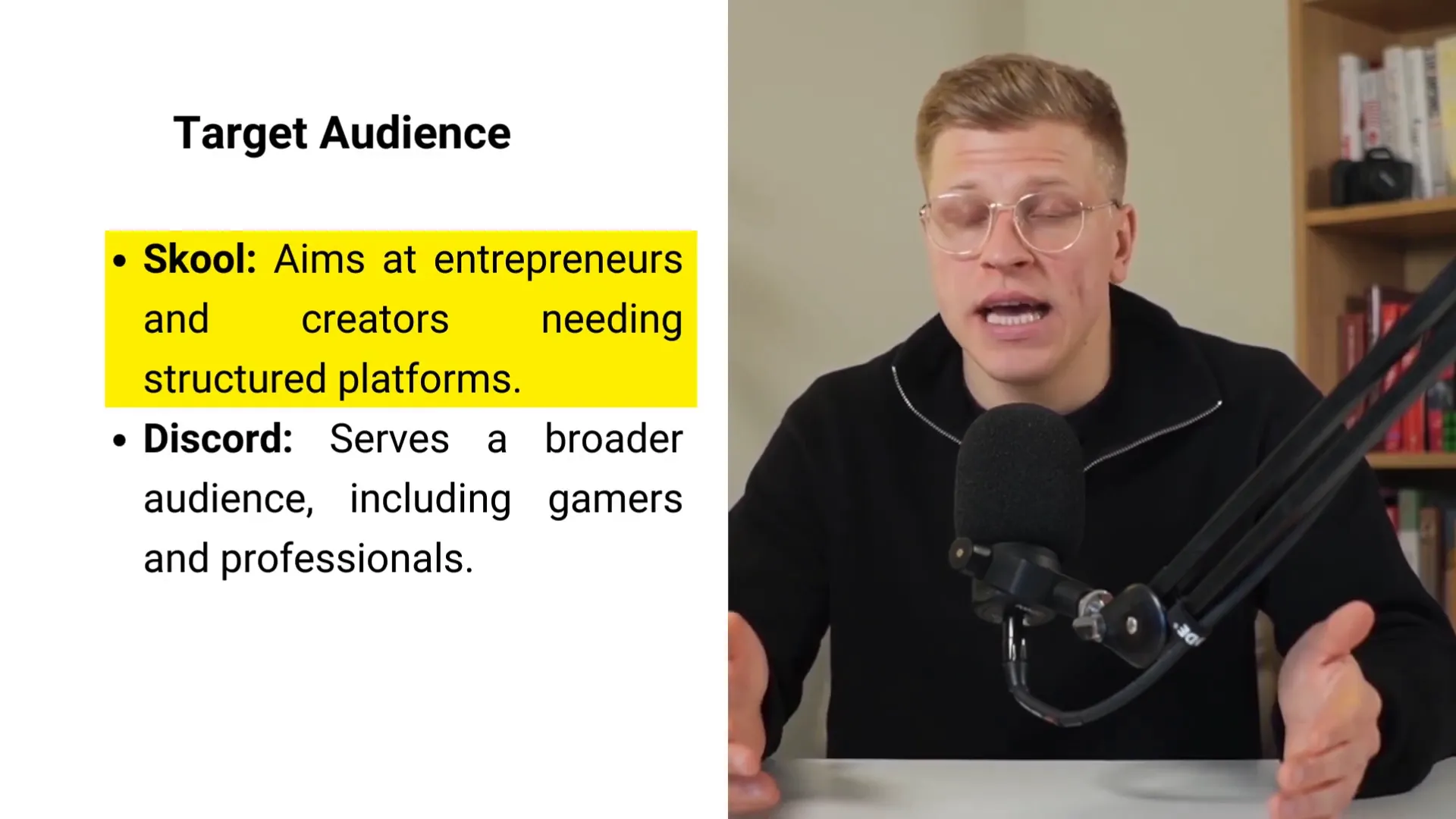
Step 4: Understanding Pricing and Accessibility
Cost and accessibility can be decisive factors when choosing between Skool and Discord.
Skool Pricing
Skool offers a 14-day free trial, after which a $99 monthly subscription is required for full access. This pricing includes all features, highlighting Skool’s commitment to providing a comprehensive toolset for serious creators and educators.
Discord Pricing
Discord operates on a freemium model. Core communication features are free, making it accessible to a vast audience. The Nitro subscription costs $9.99 per month or $99.99 annually and enhances user experience with perks such as higher quality video, server boosts, and custom emojis. Nitro is more of a platform enhancement than a creator monetization tool.
This pricing model makes Discord a great choice for those not ready to commit financially or those seeking a free communication platform with optional paid enhancements.
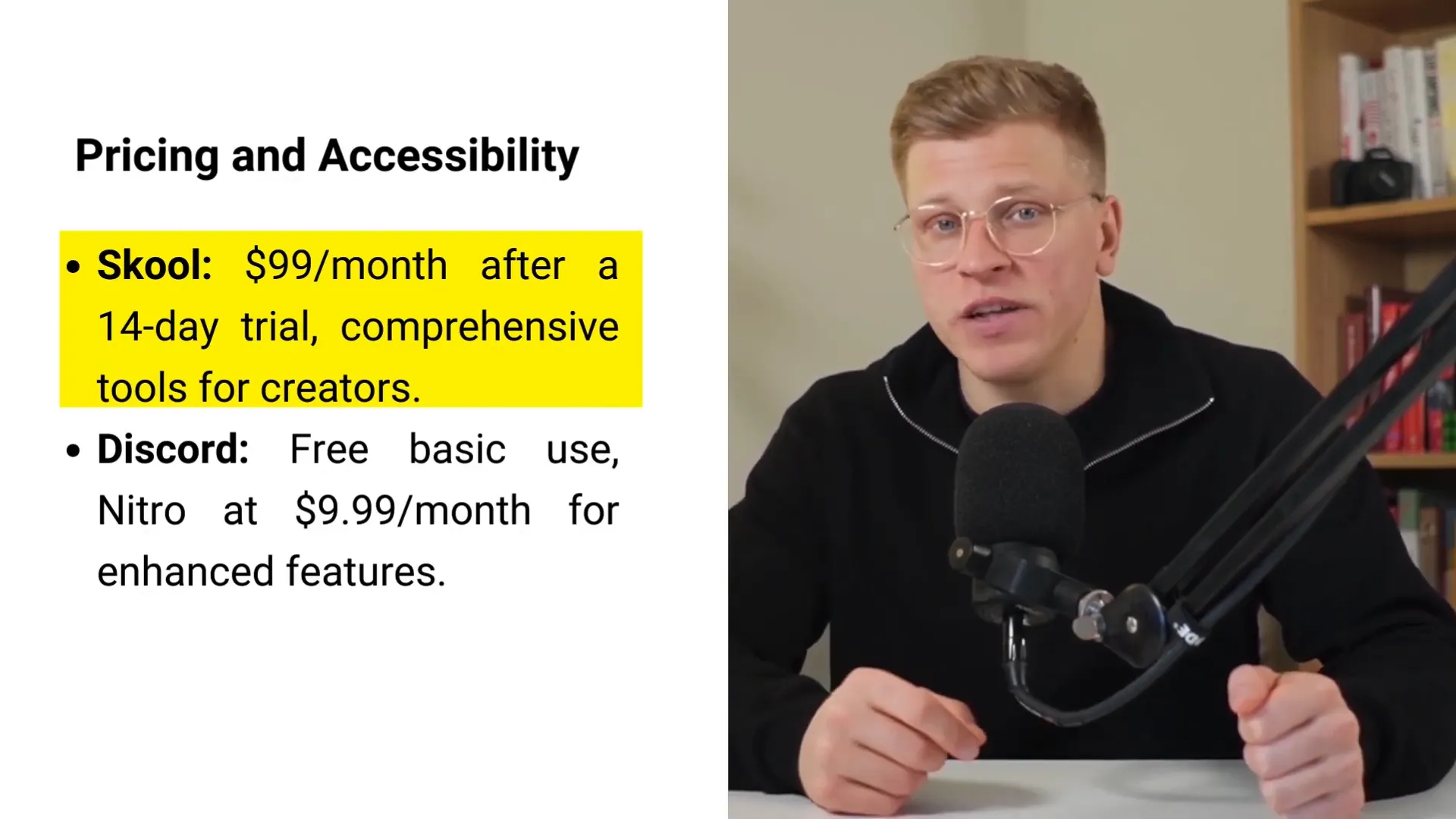
Step 5: Weighing Strengths and Weaknesses
Every platform has its pros and cons. Let’s explore what Skool and Discord excel at and where they might fall short.
Skool Strengths
- Professional environment tailored for course creation.
- Features like custom branding, dedicated account management, and advanced analytics.
- Comprehensive business tools for monetization and community management.
Skool Weaknesses
- Higher cost compared to free alternatives.
- Learning curve for beginners new to online course platforms.
Discord Strengths
- Easy to use with a large, active user base.
- Free access to core features.
- Excellent for real-time communication with voice and video.
Discord Weaknesses
- Lacks advanced monetization and customization options for creators.
- Less structured support for educational content and community building.

Step 6: Community Building Capabilities
Building a thriving community is at the heart of both platforms, but they approach it differently.
Skool’s Community Tools
- Live chat, forums, and polls to foster engagement around educational content.
- Member management and content moderation ensure a safe and structured environment.
- Event management features like scheduling, RSVP tracking, and payment processing help organize and monetize events.
Discord’s Community Tools
- Voice and video chat, screen sharing, and custom emojis create dynamic real-time interaction.
- Roles, permissions, and server insights facilitate efficient community oversight.
- Informal channels and sharing support casual and interactive gatherings.
Both platforms provide comprehensive tools for community management, but Skool’s added focus on educational engagement and event monetization sets it apart.
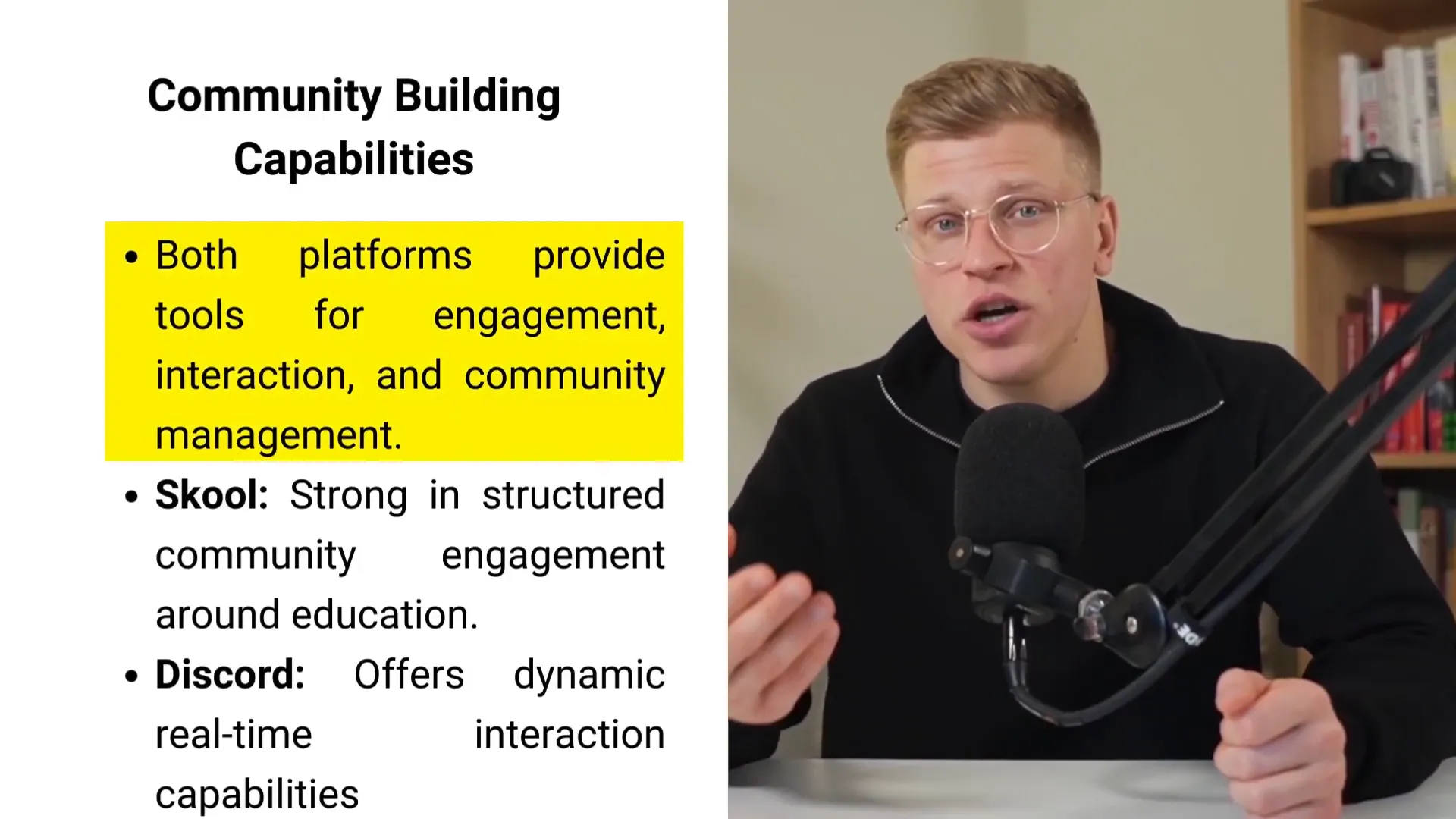
Step 7: Content Creation and Hosting
For course creators, the ability to host and organize content effectively is critical.
Skool’s Strength in Content Hosting
Skool shines in this area with a platform designed to upload various course materials, organize them into lessons or modules, and facilitate knowledge sharing through discussion forums and chat rooms. This structured approach enhances learner engagement and course delivery.
Discord’s Content Sharing
Discord allows file uploads and video sharing, but lacks the structured approach to organizing course material. It is better suited for informal content sharing rather than formal course hosting.
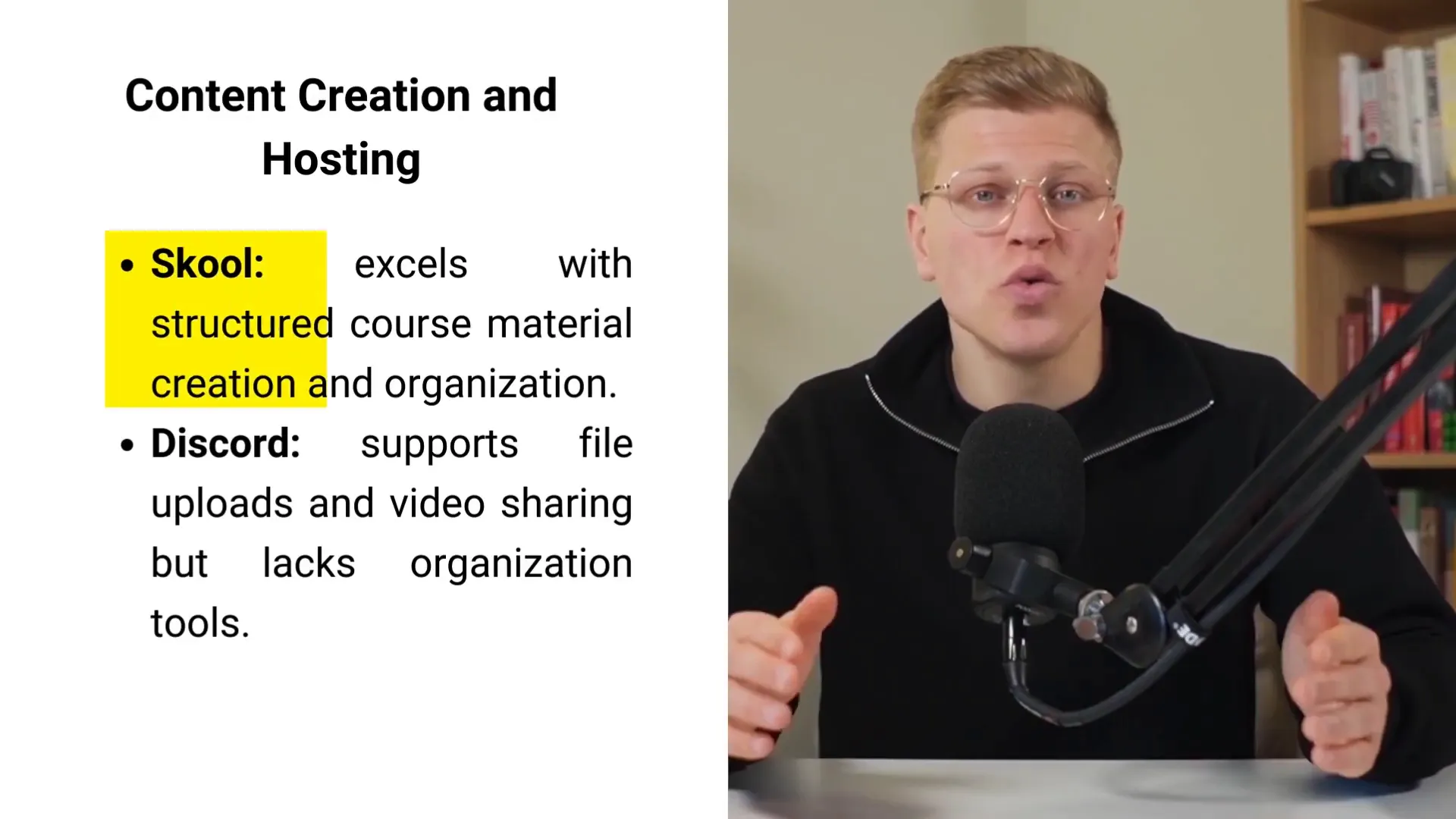
Step 8: User Experience and Customization
The way users interact with the platform significantly impacts engagement and retention.
Skool’s User Experience
Skool offers an intuitive interface with extensive customization options. Its dashboard, channels, member sections, and settings create a coherent structure for managing communities and courses. This streamlined experience benefits both creators and participants.
Discord’s User Experience
Discord’s interface, centered around communication, includes servers, channels, and settings. While it offers customization focused on personal profiles and server appearance, it requires a learning curve for new users and lacks the depth of customization found in Skool.
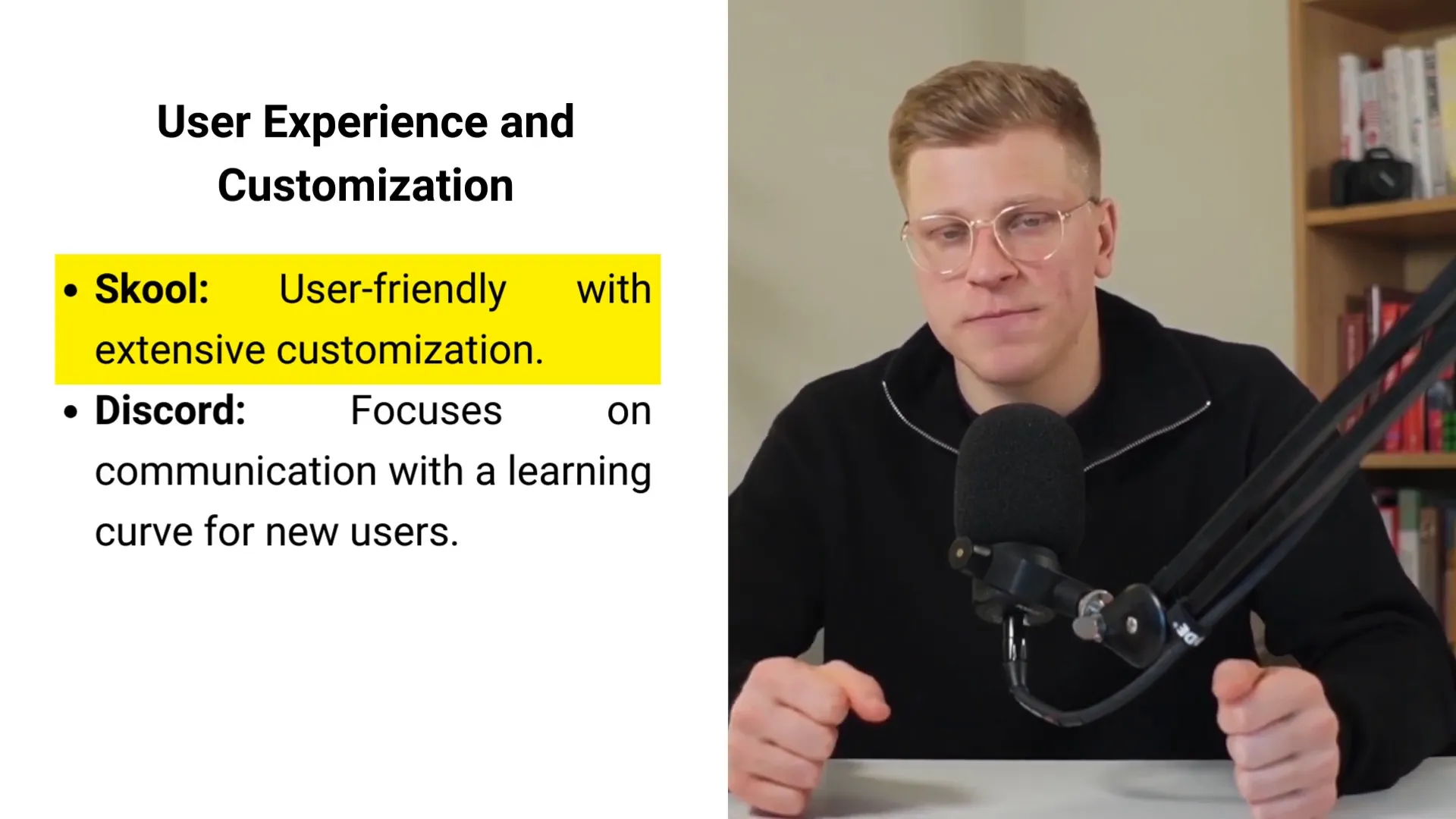
Step 9: Monetization and Business Tools
Monetizing your community or courses is a key consideration for creators and entrepreneurs.
Monetization with Skool
- Subscription memberships and affiliate programs provide direct revenue streams.
- Tools for managing memberships, processing payments, and tracking analytics.
- Designed to cater to creators aiming to generate income from their communities.
Monetization with Discord
- Nitro subscriptions enhance user experience but are not direct monetization tools for creators.
- Community engagement can indirectly attract business opportunities but lacks focused monetization features.
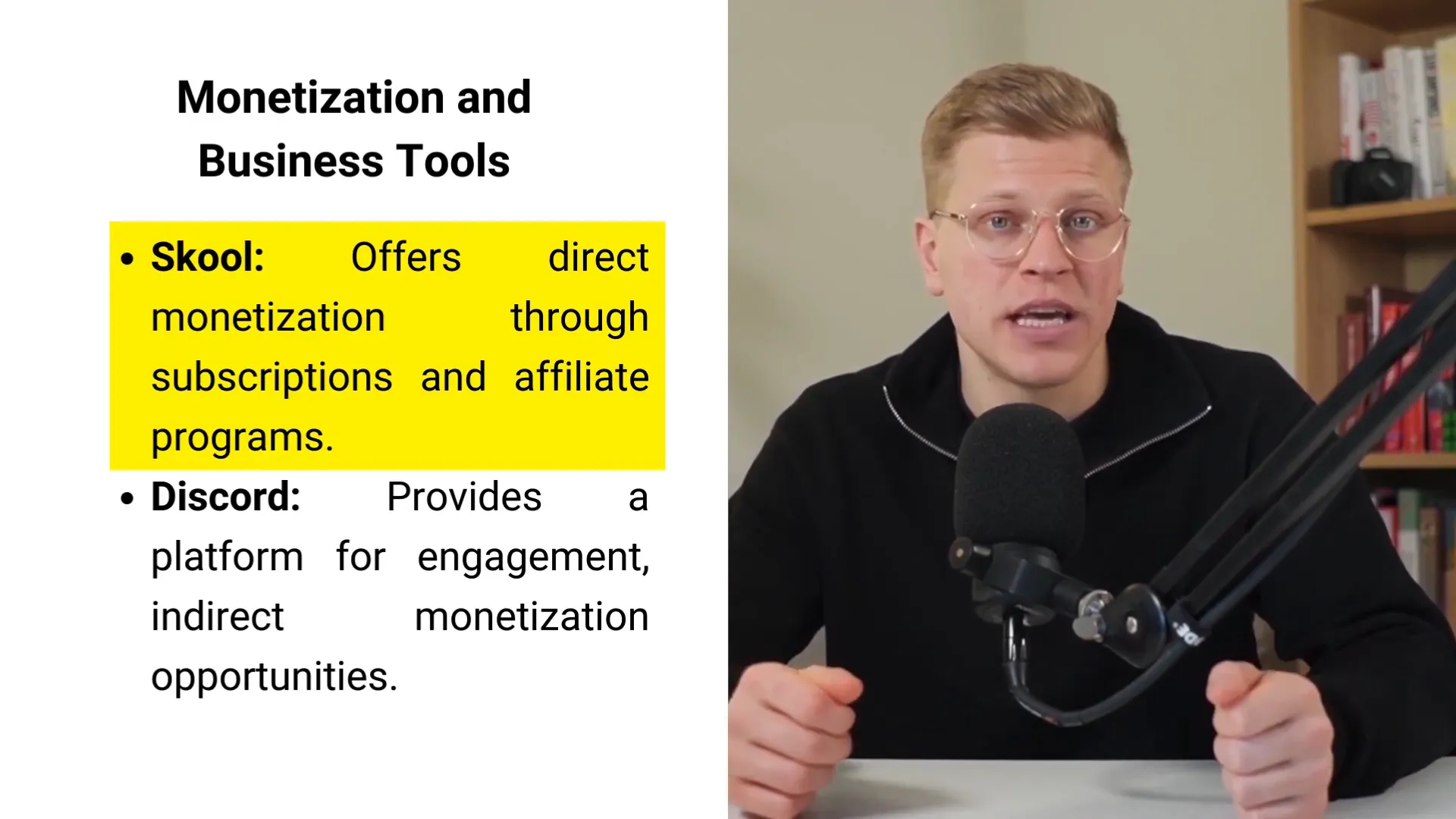
Step 10: Integration and Expansion Capabilities
Integrations with other tools and platforms can greatly enhance workflow efficiency and community growth.
Skool Integrations
Skool’s standout integration is with Zapier, a powerful tool connecting over 2,000 apps. This allows seamless workflows between Skool and other software such as email marketing platforms, CRM systems, and payment processors. Automated tasks reduce manual work, letting creators focus on content and engagement.
Discord Integrations
Discord integrates with platforms like Spotify, Twitch, and YouTube, enhancing user experience within the community. This is especially valuable for gaming, entertainment, or live event communities, encouraging real-time content sharing and discussions.
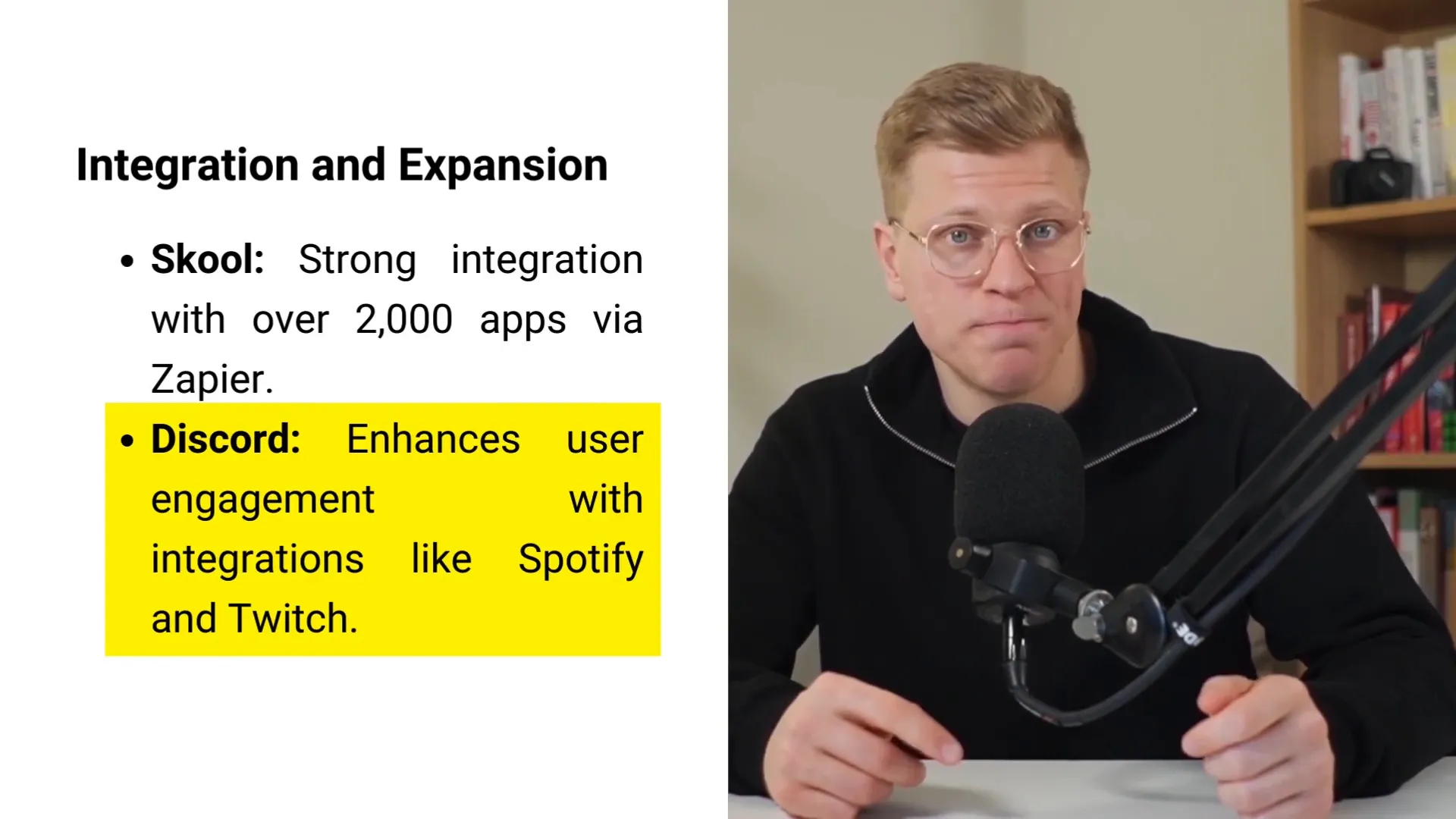
Step 11: Multi-Platform Support and Accessibility
Access across different devices and platforms is critical for maintaining active communities.
Discord’s Multi-Platform Strength
Discord is accessible on desktops, laptops, tablets, smartphones, and even via web browsers without downloads. This flexibility supports spontaneous communication and collaboration, making it ideal for fast-paced or remote groups.
Skool’s Focused Environment
Skool is a standalone platform focused on creators and educators building dedicated communities. While it does not offer the same device flexibility, it provides a distraction-free, structured environment ideal for course creation and community management.
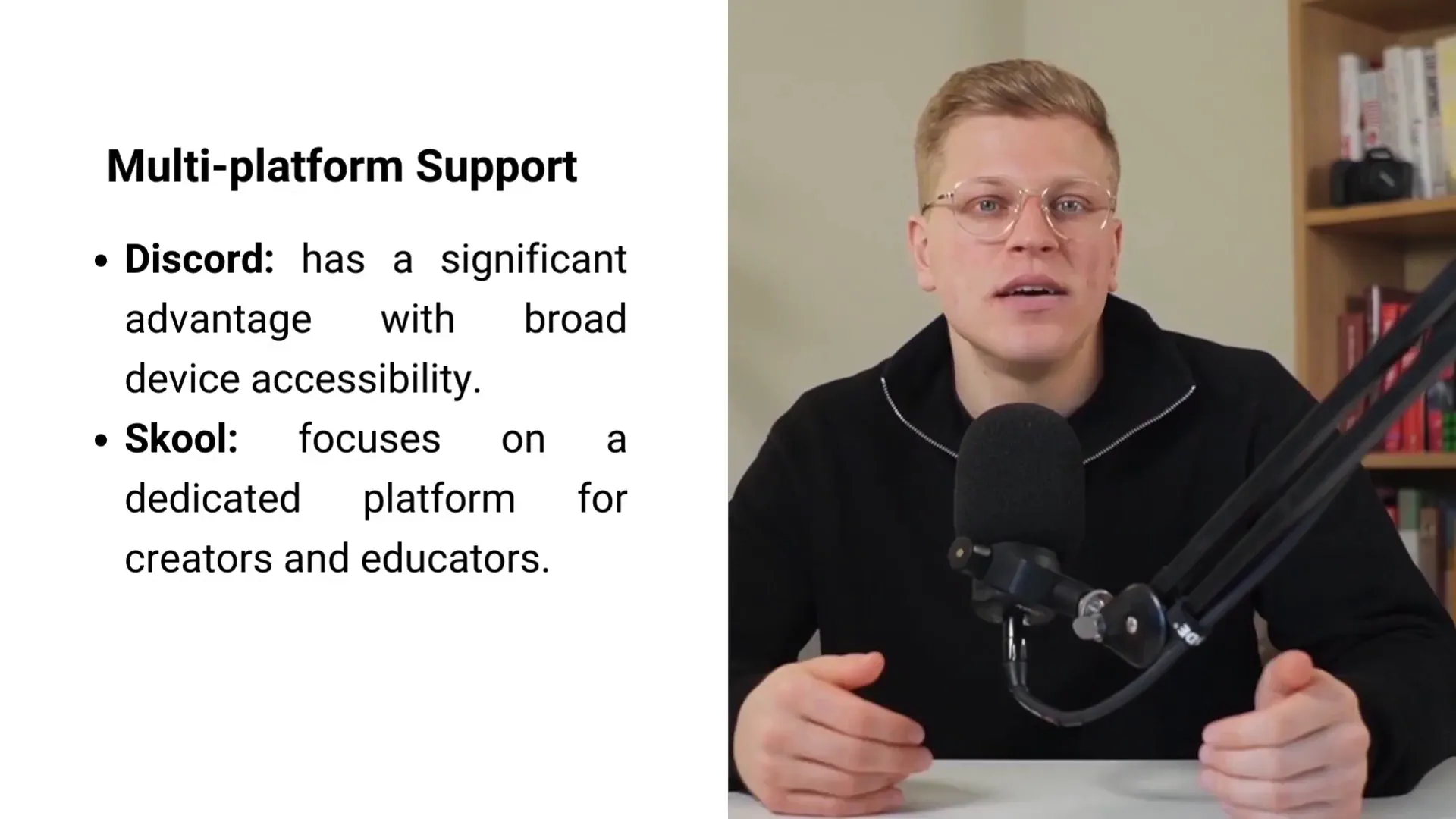
Step 12: Security and Support Systems
Protecting user data and providing reliable support are vital for any online platform.
Skool Security and Support
- Uses AES-256 encryption and allows admins to set permissions for different platform areas, securing content and membership levels.
- Offers email support, a forum, and a knowledge base to aid users in maximizing platform features.
Discord Security and Support
- Employs SSL, TLS, and encryption at rest to secure conversations and files.
- Provides support through email forms and a comprehensive knowledge base, benefiting from a large, active user community.
Step 13: Making the Final Decision
Choosing between Skool and Discord ultimately depends on your specific needs and objectives.
- Choose Skool if: You want a complete system that simplifies managing courses and groups, especially if you are a creator or teacher looking for organized, engaging, and monetizable community building.
- Choose Discord if: You value real-time chatting and connecting across diverse interests, need a platform that works well on many devices, and want easy integration with social media and other apps.
Both platforms offer powerful tools for building an online community and hosting courses, but their differences make them suited for distinctive audiences and purposes.
Frequently Asked Questions (FAQ)
Q1: Can I use Skool and Discord together?
Yes, many creators use Skool for structured course delivery and community management while leveraging Discord for real-time communication and casual interaction. This hybrid approach can maximize engagement.
Q2: Which platform is better for monetizing courses?
Skool provides direct monetization tools like subscription memberships and affiliate programs, making it the better choice for creators focused on revenue generation from educational content.
Q3: Is Discord suitable for professional communities?
Absolutely. While it started as a gamer-centric platform, Discord now supports a wide range of professional and hobbyist communities, offering versatile communication tools.
Q4: Does Skool support mobile devices?
Skool is accessible on mobile devices but does not offer the same multi-platform flexibility as Discord’s dedicated apps and web interface.
Q5: How steep is the learning curve for Skool?
Skool can have a moderate learning curve for beginners due to its comprehensive features, but its intuitive design and support resources help ease the onboarding process.
Q6: What integrations do Skool and Discord offer?
Skool integrates mainly through Zapier, connecting with thousands of business and marketing apps. Discord integrates with entertainment platforms like Spotify, Twitch, and YouTube to enhance community engagement.
Q7: Is there a free option for Skool?
Skool offers a 14-day free trial, but beyond that, it requires a paid subscription. Discord’s core features are free, with optional paid Nitro subscriptions.
Conclusion
In the Skool vs Discord debate, the best platform depends on your goals. Skool excels as a comprehensive course and community management platform, perfect for creators and educators who want a professional, monetizable environment. Discord shines as a versatile, free communication platform with rich real-time interaction features, ideal for informal communities, hobbyists, and professionals who prioritize accessibility and multi-device use.
By understanding the strengths and limitations of each, you can select the platform that best supports your community-building journey and course hosting needs. If you want a structured, all-in-one solution with business tools, Skool is your go-to. If you want dynamic, real-time communication with broad accessibility, Discord is unmatched.
Remember, you can also combine both platforms to leverage their unique advantages. Whichever you choose, building a thriving online community requires engagement, consistency, and the right tools to support your vision.
Thank you for reading this comprehensive comparison. I hope it helps you navigate the decision between Skool and Discord with confidence.
Ready to Build Your Skool Community?
Start your 14-day free trial today and turn your expertise into a thriving, profitable community that members love.
Start Free Trial